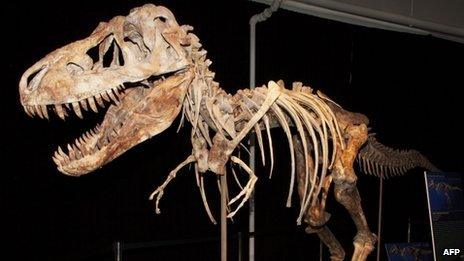US government to seize $1m Mongolian Tyrannosaurus bataar
- Published

The Tyrannosaurus Bataar was erroneously valued at $15,000 when it was shipped to the US
A 70 million-year-old Tyrannosaurus bataar, unearthed in the Gobi Desert, is to be seized by the US Department of Homeland Security.
A New York court has issued a warrant forcing an auction house to return the fossil to modern-day Mongolia, where it was discovered about seven years ago.
The dinosaur was sold at auction in New York last month by Heritage Auctions, for more than $1m (£600,000).
But the court says it was illegally imported to the US via the UK in 2010.
The Tyrannosaurus bataar, an Asian cousin of the better-known Tyrannosaurus rex, is currently being held by a fine art property company in Queens.
Since 1924, Mongolia has enacted laws protecting fossils. They have been declared the property of the state and their export is banned.
The Mongolian government objected to the May auction but, despite an injunction, the sale went ahead.
Dorset journey
A spokesman for the dealer said that the skeleton had been taken in "good faith" and that it had been sold conditionally, subject to court rulings, and was still in storage.
Co-founder of Heritage Auctions Jeff Halperin said: "We have cooperated in the investigation process for palaeontologists to expeditiously examine the skeleton, and we will continue to cooperate with authorities."
The skeleton initially found its way to Dorset, in southern England, where a collector kept the bones in a warehouse.
It was then transported to the US under the erroneous claim that the so-called "T. Bataar" had been dug-up in Britain and was worth $15,000.
According to the lawsuit, the prehistoric bones arrived in Gainesville Florida in March 2010.
The first Tyrannosaurus bataars were discovered in the Gobi desert in 1946 by archeologically expeditions which were supported by the Soviet Union.
- Published21 May 2012